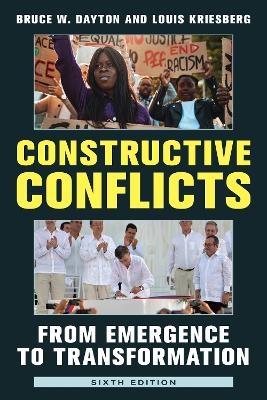
Constructive Conflicts
Rowman & Littlefield (Verlag)
978-1-5381-6099-2 (ISBN)
Constructive Conflicts explains how large-scale conflicts—such as clashes between different ideological, religious, ethnic, and racial groups; civil wars; labor-management struggles; and public policy disputes—can be waged more constructively, with more positive consequences and fewer destructive consequences for those involved. Drawing on research from political science, sociology, social-psychology, neuroscience, cultural studies, and other disciplines, Dayton and Kriesberg follow the lifecycle of social and political conflicts as they emerge, escalate, de-escalate, become settled, and often emerge again in new forms.
Throughout the book the authors present examples of conflict episodes that have avoided extreme coercion or violence and which have resulted in the advancement of the interests of most parties involved. The book gives policymakers, concerned citizens, and students a powerful analytical framework, supported by data, for understanding and constructively intervening in conflicts of different type and scale, offering a way out of the destructive cycles of conflict management which have come to characterize contemporary social and political relations.
The sixth edition pays increased attention to changes in the social and political landscape including the rise of nationalism, the erosion of liberal internationalism, conflicts related to COVID response, political polarization, and the Black Lives Matter movement. Additionally, the growth of ‘bottom-up’ strategies for peace and conflict management, the rise of misinformation in a ‘post-truth’ era, and insights from neuroscience all inform this major revision. This edition is also supplemented with end-of-chapter critical reflections, updated cases and tools for conflict analysis, and ancillary teaching materials, including experiential exercises, simulations, and PowerPoints.
Bruce W. Dayton (Ph.D., Syracuse University) serves as professor and chair of the Master of Peace and Justice Leadership, the Master of Diplomacy and International Relations, and Executive Director of the CONTACT Peacebuilding Institute at the School for International Training in Brattleboro, Vermont, USA. Professor Dayton has been active in peacebuilding and conflict transformation work for over twenty years as a practitioner, a researcher, and an educator. His other books include Perspectives in Waging Conflicts Constructively and Peacebuilding and Conflict Transformation, each co-authored with Louis Kriesberg. Bruce also served for six years as Executive Director of the International Society for Political Psychology and as Associate at the Center for Policy Negotiation in Boston, Massachusetts where he ran policy-dialogues on pressing public policy controversies. Louis Kriesberg (Ph.D., University of Chicago) is professor emeritus of Sociology, Maxwell Professor Emeritus of Social Conflict Studies, and founding director of the Program on the Analysis and Resolution of Conflicts (1986–1994), all at Syracuse University. In addition to over 160 book chapters and articles, he is the author or editor of numerous books on conflict studies. He was President of the Society for the Study of Social Problems (1983–1984), and he lectures, consults, and provides training regarding conflict resolution, security issues, and peace studies.
List of Figures and Tables
Preface
Part One: Conflict Analysis and Conflict Theory
Chapter 1. The Constructive Conflicts Approach
Plan for the Book and Intended Audience
Conflict Definitions
Six Foundational Ideas
Varieties of Conflicts
Combinations Constituting Destructiveness and Constructiveness
Summary and Discussion Questions
Chapter 2. Preconditions: Three Perspectives on the Origin of Conflicts
Human Nature
Sociocultural Relations
System Attributes
Synthesis
Summary and Discussion Questions
Part Two: Conflict Emergence and Conflict Strategies
Chapter 3. Emergence
Identity
Grievance
Forming Contentious Goals
Believing Redress is Possible
Summary and Discussion Questions
Chapter 4. Alternative Conflict Strategies: Coercion, Reward, and Persuasion
Choosing Strategies
Coercion, Reward, and Persuasion
Strategies and Modes of Struggle
Illustrative Strategies
Summary and Discussion Questions
Chapter 5. Adopting Conflict Strategies
Conflict Style
Partisan Goals
Partisan Characteristics
Relations between Adversaries
Social Context
Summary and Discussion Questions
Part Three: Conflict Escalation and De-Escalation
Chapter 6. Escalation
Processes of Escalation
Summary and Discussion Questions
Chapter 7. De-Escalation
Social-Psychological Dynamics
Organizational and Tactical Dynamics
Systemic and Structural Dynamics
De-Escalation Strategies
Summary and Discussion Questions
Part Four: Mediation, Negotiation, and Post-Conflict Outcomes
Chapter 8. Mediation
Definitions, Applications, and Benefits
Social Roles
Shapers of Mediator Roles
Assessing Mediator Contributions
Summary and Discussion Questions
Chapter 9. Negotiated and Non-Negotiated Settlements
Non-Negotiated Settlements
Negotiated Settlements
Forms and Stages of Negotiation
Summary and Discussion Questions
Chapter 10. Post-Settlement Outcomes
Variations in Post-Settlement Outcomes
Constructive Transformations
Summary and Discussion Questions
Chapter 11. Toward Constructive Conflict Transformation
Appendix A: Selected Organizations in the Field of Constructive Conflicts
| Erscheinungsdatum | 21.07.2022 |
|---|---|
| Verlagsort | Lanham, MD |
| Sprache | englisch |
| Maße | 158 x 237 mm |
| Gewicht | 685 g |
| Themenwelt | Sozialwissenschaften ► Politik / Verwaltung ► Europäische / Internationale Politik |
| Sozialwissenschaften ► Politik / Verwaltung ► Staat / Verwaltung | |
| ISBN-10 | 1-5381-6099-4 / 1538160994 |
| ISBN-13 | 978-1-5381-6099-2 / 9781538160992 |
| Zustand | Neuware |
| Haben Sie eine Frage zum Produkt? |
aus dem Bereich


